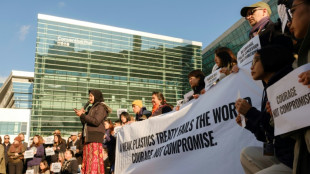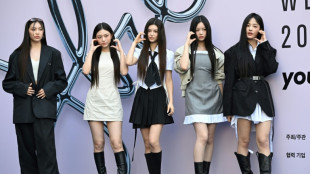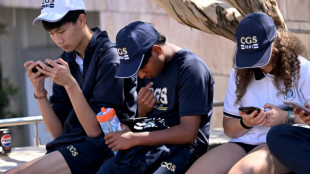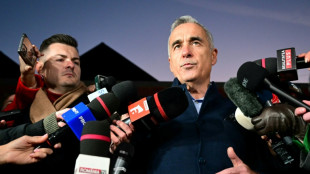
-
 British MPs debate contentious assisted dying law
British MPs debate contentious assisted dying law
-
Macron offers first glimpse of post-fire Notre Dame

-
 Syria jihadists, allies shell Aleppo in shock offensive
Syria jihadists, allies shell Aleppo in shock offensive
-
Japan government approves $92 bn extra budget

-
 Toll in Syria jihadist-army fighting rises to 242: monitor
Toll in Syria jihadist-army fighting rises to 242: monitor
-
UK transport secretary quits in setback for Starmer

-
 Days before deadline, plastic treaty draft highlights disagreement
Days before deadline, plastic treaty draft highlights disagreement
-
Crypto boss eats banana art he bought for $6.2 million

-
 Teen news boss criticises Australian social media ban
Teen news boss criticises Australian social media ban
-
Taiwan detects 41 Chinese military aircraft, ships ahead of Lai US stopover

-
 Spain urged to 'build differently' after deadly floods
Spain urged to 'build differently' after deadly floods
-
WTO chief faces heavy task as Trump threat looms

-
 Herbert takes control at Australian Open as Smith tanks
Herbert takes control at Australian Open as Smith tanks
-
Israel PM again warns Iran after top diplomat talks of revising nuclear doctrine

-
 Brilliant Brook's 132 puts England on top against sloppy New Zealand
Brilliant Brook's 132 puts England on top against sloppy New Zealand
-
Brilliant Brook's 132 puts England on top against New Zealand

-
 US landmine offer to Ukraine throws global treaty into 'crisis': campaign group
US landmine offer to Ukraine throws global treaty into 'crisis': campaign group
-
Singapore hangs 4th person in three weeks

-
 Five things to know about NewJeans' shock split from agency
Five things to know about NewJeans' shock split from agency
-
Waste pickers battle for recognition at plastic treaty talks

-
 Ireland votes in closely fought general election
Ireland votes in closely fought general election
-
Top UN court to open unprecedented climate hearings

-
 European countries that allow assisted dying
European countries that allow assisted dying
-
British MPs to debate contentious assisted dying law

-
 Schmidt not expecting hero's welcome on Ireland return
Schmidt not expecting hero's welcome on Ireland return
-
PSG stuck between domestic dominance and Champions League woes

-
 'Hot fight' as unbeaten Bayern visit Dortmund fortress
'Hot fight' as unbeaten Bayern visit Dortmund fortress
-
Bordeaux-Begles' Samu 'not finished yet' with Wallabies

-
 Brook and Pope half-centuries haul England to 174-4 against NZ
Brook and Pope half-centuries haul England to 174-4 against NZ
-
Yen rallies on rate hike bets as equity markets swing

-
 Ukraine superstar Mahuchikh brings 'good vibes' to her war-torn country
Ukraine superstar Mahuchikh brings 'good vibes' to her war-torn country
-
PlayStation at 30: How Sony's grey box conquered gaming

-
 Saudi Arabia hosts UN talks on drought, desertification
Saudi Arabia hosts UN talks on drought, desertification
-
PlayStation: Fun facts to know as Sony's console turns 30

-
 Nepal's first transgender candidates run for local office
Nepal's first transgender candidates run for local office
-
Father of PlayStation says 'everyone told us we would fail'

-
 Ireland seek to overcome former coach Schmidt's Wallabies
Ireland seek to overcome former coach Schmidt's Wallabies
-
Detroit survive Bears comeback to make it 10 wins in a row

-
 Mexican actor Silvia Pinal dead at 93
Mexican actor Silvia Pinal dead at 93
-
'Black Friday' deals target inflation-weary US consumers

-
 Liverpool look to deepen Man City crisis, Amorim seeks first Premier League win
Liverpool look to deepen Man City crisis, Amorim seeks first Premier League win
-
Police fire rubber bullets, tear gas at Georgia protesters after PM delays EU bid

-
 England lose three quick wickets in reply to New Zealand's 348
England lose three quick wickets in reply to New Zealand's 348
-
Social media companies slam Australia's under-16 ban

-
 Police fire tear gas at Georgia protesters after PM delays EU bid
Police fire tear gas at Georgia protesters after PM delays EU bid
-
Canada watchdog sues Google over 'anti-competitive' ad tech

-
 Hojlund gives Amorim winning Old Trafford bow, Roma hold Spurs
Hojlund gives Amorim winning Old Trafford bow, Roma hold Spurs
-
Amorim wins first Man Utd home game after rollercoaster ride

-
 France arrests 26 as South Asian migrant trafficking ring smashed
France arrests 26 as South Asian migrant trafficking ring smashed
-
At least 15 dead, 113 missing, in Uganda landslides


Iraq fashionistas champion climate-friendly vintage wear
In a palm grove north of Baghdad, bemused Iraqi shepherds looked on as models paraded second-hand garments down an improvised catwalk, seeking to raise awareness of the fashion industry's environmental impact.
Haute couture has given way to upcycled outfits, sourced entirely from used clothes, as the models strut, pause and pivot on the runway, a sign of the growing popularity of chic, environmentally friendly vintage wear among young Iraqis.
"We don't want overproduction of clothes, we have to reuse them," said Mohamed Qassem, 25, a hairdresser and organiser of the fashion show near Al-Hussainiya village.
The global fashion industry accounted for two percent of greenhouse gas emissions in 2019, according to the World Resources Institute.
Campaigners and a growing number of climate-conscious social media influencers have led a push toward sustainable fashion.
Many young people in climate-stressed Iraq, like Qassem, have become passionate about vintage clothing.
The palm grove event showcased fluorescent green puffer jackets, long black leather coats, ample double-breasted blazers, and modern takes on traditional costumes.
In many parts of Iraq, scarred by decades of conflict, peaceful rhythms are gradually returning to daily life and second-hand clothing offers aspiring fashionistas an affordable chance to express themselves.
- Climate threats -
As Baghdad's streets see more "fast-fashion" and imported brands, the outfits at the Al-Hussainiya event predominantly feature green elements, a nod to the show's environmental message.
Iraq, synonymous with date production, has seen its iconic date palms placed under stress by the effects of climate change and the years of conflict.
"The goal is not to focus only on clothes, but also abandoned orchards, palm trees that disappear every day," Qassem said.
The United Nations says oil-rich Iraq is one of the five countries most exposed to the impacts of climate change, already witnessing extreme summer heat, frequent droughts, desertification and regular dust storms, which will exacerbate as the planet heats.
The designs at the fashion show will not be put on sale. Organisers mainly hope the symbolic parade will raise awareness.
Ahmed Taher, a 22-year-old stylist who put together the sets for the show, said "second-hand pieces are clothes of excellent quality".
"When you wear them, you have the impression of wearing luxury clothes. It's different from what you find in stores."
A business student, Taher offers Baghdad's hipsters vintage clothes on Instagram -- where he has around 47,000 followers -- selling pieces for around $20.
"We want to wear unique clothes and not all look like each other," he said.
- 'Last a lifetime' -
A student-turned-model for the day, Safaa Haidar, said she was attracted to vintage clothes as she could shop "according to my personality".
But in Iraq, where the UN estimates nearly one-third of the 42 million inhabitants live in poverty, many wear used clothing out of necessity.
In the winding alleys of central Baghdad's second-hand clothes market, stalls overflow every Friday with shirts, shoes and jeans, with shoppers checking sizes in front of the sellers.
Here a shirt can cost barely $2, while other pieces can sell for as much as $60 or even $200.
Mohamed Ali, a 20-year-old engineering student, came to buy shoes.
"It's not that we can't afford to buy new, but here we find better quality and unique pieces," he said.
Ali recounted his parents' stories from life in the 1990s, when Western sanctions against Iraq meant they would wear clothes, even "inside out, until they were worn out, because they could not afford" new ones.
Now, Ali and most of his friends shop for vintage clothes for their durability and style, he said.
Merchant Hassan Refaat, 22, sells imported second-hand clothes which find a new life in Iraqi wardrobes.
He also imports goods from Iraq's northern autonomous Kurdistan region, bordering major textile producer Turkey.
"Second-hand clothes are of better quality than the new clothes available on the market," he said.
"Very often, they are branded pieces, and the brands last a lifetime."
M.Ouellet--BTB

